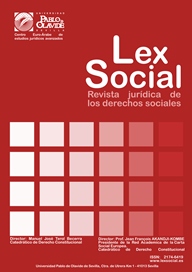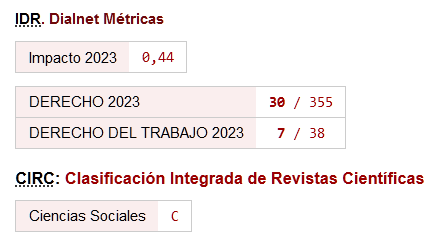Informes anuales, derechos sociales y Ombudsmen: Portugal, Colombia y El Salvador
DOI:
https://doi.org/10.46661/lexsocial.4544Keywords:
Human Rights, Ombudsman, ESCR, NHRIAbstract
Annual reports (AR) are one of the sources that best reveal the day-to-day responsibilities of ombudsmen in their oversight of social rights. In addition, the importance of AI is even more relevant when ombudsmen also act as National Human Rights Institutions (NHRIs). With the purpose of dimensioning the daily work of social rights supervision by ombudsmen/INDH, in the exercise of their responsibility of supervision of the Administration taking into account different contexts, it has been carried out a comparative experience exercise of the AI of ombudsmen/INDH of Portugal, Colombia and El Salvador. In order to do this, firstly, it has been analyzed how these rights mean in the three countries, and secondly, how these rights are monitored in each of them. Finally, it has also been analyzed the extent to which the institutions of Portugal, Colombia and El Salvador have instruments for the adequate monitoring of the implementation of social rights, as well as the extent to which they have appropriate mechanisms for their implementation within the framework of their mandate to oversee public powers.
Downloads
References
ARBOUR, L. (2012). Justicia económica y social para sociedades en transición.
Recuperado de:
CIFUENTES, E. (2002). «El seguimiento de las políticas públicas», en El trabajo y la práctica de los Defensores del Pueblo y las Instituciones Nacionales de Derechos Humanos. Centro Danés de Derechos Humanos, Ministerio de Relaciones Exteriores, pp. 93-94.
CONAGHAN, C. M. (2004). «Más allá del minimalismo: una agenda para unir democracia y desarrollo», en La democracia en América Latina. Hacia una democracia de ciudadanas y ciudadanos. El debate conceptual sobre la democracia. Programa de las Naciones Unidas para el Desarrollo, pp. 107-120.
CONSTELA, CARLOS R. (2010). Teoría y práctica del Defensor del Pueblo. Madrid: Editorial Reus (Biblioteca Iberoamericana de Derecho).
ESCOBAR ROCA, G. (S/f). Materiales de Derechos Económicos, Sociales y Culturales. PRAPDI.
ESCOBAR ROCA, G (2005). Introducción a la teoría jurídica de los derechos humanos. Trama Editorial- CICODE.
GOIG MARTÍNEZ, J. M. (2006). Los derechos económicos y sociales. En: Dogmática y práctica de los derechos fundamentales. Tirant lo Blanch. P. 415-449
OSBORNE, D. Y GAEBLER, T. (1994). La reinvención del Gobierno. La influencia del espíritu empresarial en el sector público. Barcelona: Ediciones Paidós.
PISARELLO, G. (2007). Los derechos sociales y sus garantías. Elementos para una reconstrucción. Editorial Trotta.
SANDOVAL, C. (2013). «La justicia transicional y las violaciones de derechos económicos, sociales y culturales», en Revista Aportes (revista de la Fundación para el Debido Proceso). 6, (18), diciembre 2013, pp. 8-10.
SANTISTEVAN, J. (1999). «El Ombudsman y los derechos humanos», en El Defensor del Pueblo. De la teoría a la práctica. Defensor del Pueblo de Bolivia-CAJ. PNUD.
SANTOS DE SOUSA, B. (2005). El milenio huérfano. Ensayos para una nueva cultura política. Editorial Trotta/ ILSA.
SANTOS DE SOUSA, B. (2014). Si Dios fuese un activista de los derechos humanos. Madrid: Editorial Trotta.
PRATT, M. L. (2010). Ojos imperiales. México: Fondo de Cultura Económica.
REIF, L. C. (2004). The Ombudsman, Good Governance and the International Human Rights System. Martinus Nijhoff Publisher, p. 5.
Downloads
Published
How to Cite
Issue
Section
License
Copyright (c) 2020 Lex Social: Revista de Derechos Sociales

This work is licensed under a Creative Commons Attribution-NonCommercial-NoDerivatives 4.0 International License.
-
Atribución — Usted debe dar crédito de manera adecuada, brindar un enlace a la licencia, e indicar si se han realizado cambios. Puede hacerlo en cualquier forma razonable, pero no de forma tal que sugiera que usted o su uso tienen el apoyo de la licenciante.
-
NoComercial — Usted no puede hacer uso del material con propósitos comerciales.
-
CompartirIgual — Si remezcla, transforma o crea a partir del material, deberá difundir sus contribuciones bajo la misma licencia que el original.



 @Lex Social
@Lex Social Linkedin
Linkedin @lexrevista.bsky.social
@lexrevista.bsky.social



